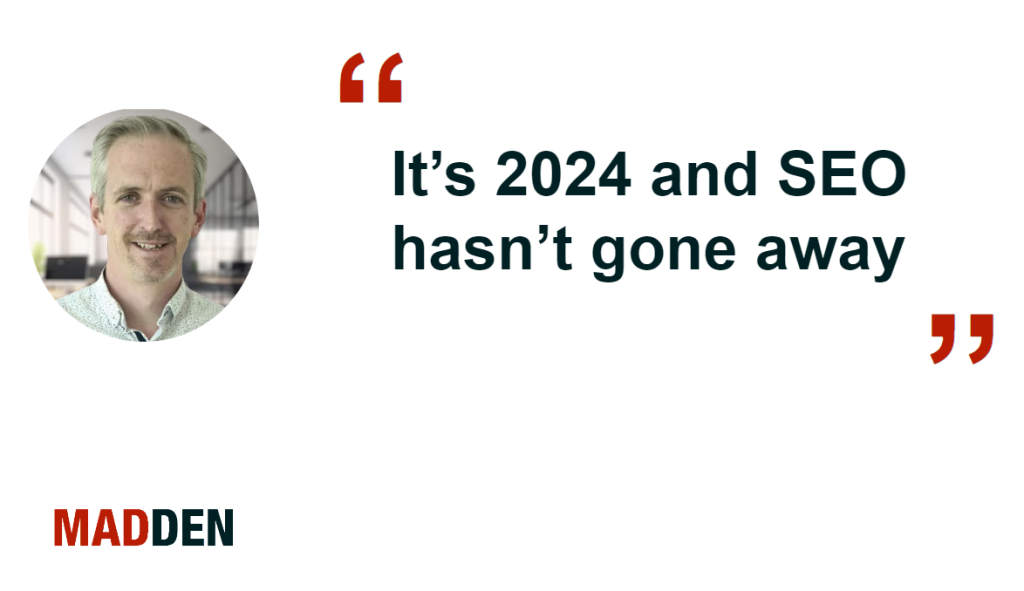
Search engine optimisation (SEO) was an accessible, low-cost opportunity for small and medium sized businesses to compete with bigger brands who had deeper pockets. It allowed early adopters who were willing to put in the effort to earn brand and product visibility where their giant competitors were still in sleep mode, slow to figure out the significance the internet would have on all forms of commerce.
For anyone involved in digital marketing in those days, it was a fast-paced, dynamic rollercoaster ride with fresh, frenetic learning curves at every turn. The system was easily rigged – some tried and trusted SEO tactics were far less ethical back then – for instance, keyword stuffing, link wheels and buying links were commonplace and the ability to manipulate search results in the short-term was there for all to attempt. I cannot advocate for these tactics and nowadays the risk of using these approaches is higher as the quality of search has improved, but they were used to good effect. Despite the risks, some digital agencies thrived off this approach but it’s those that played within the rules that typically stood the test of time.
SEO back then took time and effort – it still does today. It reaped significant rewards – it still does today. Yet for many Irish businesses, SEO is still largely an unknown. Marketing planning and budgets don’t tend to put a lot of focus on SEO, especially for businesses with smaller budgets. It is often confused with pay-per-click (PPC) or paid Google advertising and while the two probably work best hand-in-hand, they are very different in terms of what’s involved.
Circa 2008/09 and Eric Schmidt’s cesspool comment, Google began what seemed like a relentless focus on search quality which saw several algorithm updates including Caffeine, Panda & Penguin which drastically reduced the effectiveness of underhand SEO tactics and played into the hands of bigger brands who had the budgets to ‘do it right’ at scale.
By the time this series of quality-focused updates had taken hold in 2012/13, many observers began to suggest that SEO was dead. 11 years further on, that certainly is not the case and many businesses take a nimble approach to generating traffic through organic search results.
Make no mistake, SEO is the ‘long game’ when it comes to digital marketing. It involves real graft over a prolonged period of time – maybe this explains why businesses bypass it or pay lip service to it in their marketing strategy. It might seem like too long a wait for a return on investment. If that is the case, a front-loaded PPC strategy could fill the void while the SEO strategy beds in – each case is different but ignoring SEO seems like a wasted opportunity. There is a well-documented methodology just a Google search away and the work does pay off in time.
Over the years, it has gotten harder to tell the difference between paid results and organic results in Google search results and this is likely to be another deterrent for small businesses but the opportunity remains.
While content management systems like WordPress, SquareSpace and Wix have improved out-of-the-box functionality for SEO, there’s still a lot work to be done to be competitive – especially so where you might be competing directly against big-budget brands that have seemingly endless resources to throw at optimising their content.
Even without paid SEO tools like SEMRush, investing a small amount of time each week reviewing Google Analytics and Google Search Console dashboards for your website (if implemented) can provide a significant steer on how web searchers arrive at your site – what they are looking for and the language they use. Even if SEO is never to feature in your marketing strategy, this raw data can inform other aspects of your marketing strategy and perhaps even product development.
Artificial Intelligence (AI) is at the top of everyone’s lips today and the world of search is no different. Here are a couple of ways that quickly becomes relevant in 2024:
Google’s Search Generative Experience (SGE) is already here – AI-powered search results which appear at the top of search results for certain terms. This evolution towards a more interactive search experience is a signal of the direction Google is heading in.
Voice activated search and virtual assistants are becoming commonplace, so optimising for natural language search queries and conversational language will be important. Being able to answer common searches (for your industry) clearly and concisely represents an organic traffic opportunity.
While authority, thought leadership and expertise have been important for several years now, many experts foresee a focus on first-hand experiences and subject matter expertise in this latest evolution of content creation. This could prove to be a fascinating development in a world awash with so-called ‘misinformation’ and ‘disinformation’, especially given that every perspective including AI tools are subject to some degree of bias – where will the chips fall? It’s hard to know.
To provide the best experiences, we use cookies to store and/or access device information. Consenting to cookies will allow us to process data such as browsing behaviour or unique IDs on this site. Not consenting or withdrawing consent, may adversely affect certain features and functions.